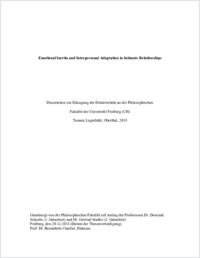Emotional Inertia and Interpersonal Adaptation in Intimate Relationships
- Luginbühl, Tamara
- Schöbi, Dominik (Degree supervisor)
-
2018
1 ressource en ligne (172 p.)
Thèse de doctorat: Université de Fribourg, 2018
English
Emotions are not static but fluctuate over time as a function of contextual changes (Kuppens, Allen, & Sheeber, 2010). This temporal feature of emotions is considered in the concept of emotional inertia, which reflects the degree to which emotions are resistant to change over time (Kuppens et al., 2010). Several studies suggest an association between emotional inertia and psychological maladjustment (e.g., Koval & Kuppens, 2012; Kuppens et al., 2010). The current work aims to extend the literature by elucidating the maladaptive impact of emotional inertia on intimate relationships. Three empirical contributions are included in the present doctoral thesis. Study I has a methodological focus. The paper illustrates how processes that occur within individuals and dyads can be accessed using intensive repeated measures designs based on ambulatory assessment procedures, and discusses advantages and challenges of such designs. The example that is used as illustration examines associations between emotional inertia and accuracy in perceiving partners’ emotions in daily life. Parents from 172 families rated their own and their partner’s emotional states six times a day during one week. The results revealed that both parents were able to predict the emotions of their partners’ accurately, but women with high levels of emotional inertia were particularly accurate in tracking emotional changes in their partners’. Study II examined short-and long-term correlates of emotional inertia in two studies. Study 1 examined associations between emotional inertia and emotional reactivity to conflict and intimacy. Momentary assessments from 44 participants were collected with an ambulatory assessment four times per day over 4 weeks. Emotional inertia showed a curvilinear association with context-sensitive emotional responses to conflict, with individuals high or low in emotional inertia experiencing blunted emotional reactions to conflict as compared to individuals with intermediate levels of emotional inertia. Study 2 assessed emotional inertia based on four emotional reports per day over 10 days of both partners in a total of 103 couples, and examined associations with perceptions of partners’ responsiveness and relationship satisfaction over 12 months. Compared to partners of individuals with intermediate levels of emotional inertia, partners of individuals high or low in emotional inertia perceived them to be less responsive during their interactions together, which then predicted steeper declines in their relationship satisfaction over the subsequent 12 months. Study III combined an ambulatory assessment procedure with an observational approach to explore whether emotional inertia is associated with emotion response patterns in couple support interactions that are predictive of relationship dysfunction. Individual differences in emotional inertia of 134 individuals (n=67 couples) were captured using a smartphone-based ambulatory assessment with four daily emotional self-reports across two weeks. Emotions in couple interactions were operationalized through reciprocity of facial expressions of emotions during videotaped social support interactions in the laboratory. Facial expressions of emotions were analyzed with the facial expression recognition and analysis software FACET (iMotions, 2015), and defined as the helper (or support provider) responding with equivalent facial expressions of emotions as the helpee (or support receiver). The results suggest that emotional inertia is associated with greater reciprocity of non-affiliative facial expressions of emotions (hard negative affect), but less reciprocity of affiliative facial expressions of emotions (positive affect, soft negative affect). Taken together, the results suggest that emotional inertia may interfere with the social function of emotions, that is to guide an individual's behavior in adaptive ways within relational situations (Keltner & Gross, 1999; Keltner & Haidt, 2001), affecting individual and relational functioning.
- Faculty
- Faculté des lettres et des sciences humaines
- Language
-
- English
- Classification
- Psychology
- Notes
-
- Ressource en ligne consultée le 15.01.2019
- License
- License undefined
- Identifiers
-
- RERO DOC 323798
- URN urn:nbn:ch:rero-002-118026
- RERO R008885074
- Persistent URL
- https://folia.unifr.ch/unifr/documents/307395
Statistics
Document views: 470
File downloads:
- LuginbuehlT.pdf: 255
